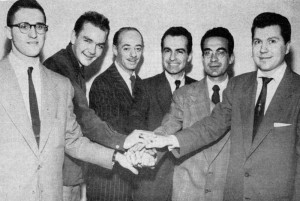Jaki Byard Symposium; Brew Moore’s 90th
It was nice being greeted by news of the late Worcester native Jaki Byard this morning. First, Alan Pasqua mentioned him in a news story about concerts he’s playing in Santa Fe and Albuquerque this week. “The Grammy-nominated Pasqua knows for sure of one composition that will be played in the concerts,” reports the Albuquerque Journal. “Titled ‘Chandra,’ it was composed by his former piano teacher Jaki Byard. ‘I want to pay my respects to him’,” said the pianist. Pasqua carries on another legacy of Byard’s as a professor of jazz studies at USC where he impresses on students another aspect of what Jaki valued. “‘I’m into melody. I want to hear and play things that go deep and last’.”

Next I opened mail from George Schuller containing a new CD by Yard Byard and a note informing me of a Jaki Byard Symposium being held at WPI on Sunday, April 13. Schuller is a co-founder of Yard Byard, a cleverly titled ensemble devoted to Jaki’s music. Four of the quintet’s members studied under Byard at the New England Conservatory of Music, the august Boston institution that opened its curriculum to jazz during George’s father Gunther Schuller’s tenure as NEC’s president in the 1960’s and ’70’s. While at NEC, Byard established a Boston branch of The Apollo Stompers, the big band that held forth on Wednesday nights for a decade or more at Michael’s Pub off Huntington Ave. Yard Byard members Jamie Baum, Adam Kolker, Jerome Harris and Schuller all played with the Stompers. I wrote about a memorable night hearing them at Michael’s Pub in 1977 in this earlier blog about Byard.
Here’s Yard Byard playing Jaki’s original “Aluminum Baby,” a work that Herb Pomeroy’s orchestra premiered in 1958.
Today is Brew Moore’s 90th birthday anniversary. Milton Aubrey Moore, Jr. is one of the few jazz greats (Teddy Edwards, Mose Allison, and Cassandra Wilson being others) born in Mississippi, in Brew’s case Indianola, the Delta town that was also B.B. King’s birthplace. Strictly speaking, Lester Young was also a Mississippian, born in Woodville in 1909, but he spent his formative years in Algiers, Louisiana across the river from New Orleans. Whether their mutual roots in Ole Miss made a difference to Moore is unknown, but his devotion to Young as a stylist is without question. Moore may have been the most ardent of Lester’s many disciples; he held his horn at the same 45-degree angle as Pres, and his tone and phrasing bore an uncanny resemblance to his hero. Moore famously declared that “anybody who doesn’t play like Pres is wrong,” but later amended this dictum when he acknowledged to John S. Wilson in a 1968 article in the Times that Charlie Parker was also an influence. “When I heard what Bird had done for himself, I realized that Pres was not the complete Messiah.”

Wilson’s profile of Moore was occasioned by the saxophonist’s return to New York 20 years after he’d come to prominence there in the late ‘40’s. Brew was part of the group of white Lestorians once hailed as “Brothers and Other Mothers,” the former including Stan Getz, Al Cohn, Zoot Sims, Serge Chaloff, and Herbie Stewart, all of whom were associated with Woody Herman’s Four Brothers band; the latter alluded to Moore and Allen Eager. While in New York, he played with Claude Thornhill, George Wallington, and Machito, and Ira Gitler reported in Jazz Masters of the Forties that Brew and Charlie Parker jammed together at the Open Door, on one occasion strutting “around the dance floor in a musical ‘goosing’ session, finished up by playing to a large spot of old chewing gum stuck to the floor.” Bird and Brew also played together in Montreal in 1953.

Moore left New York for San Francisco around 1953, traveling west in a car whose occupants included Woody Guthrie and Ramblin’ Jack Elliott. Steven Cerra’s profile of Moore, “A Wandering, Soulful Tenor Saxophonist,” reports that Guthrie disliked jazz, and once he heard Brew play, spoke to him only through a third party, as in, “Ask Mr. Moore to pass me the wine.” Road journeys like these were mythical to Jack Kerouac, and so was Moore, who appeared in Desolation Angels as Brue Moore, the tenor player whose solo began with a “perfect beautiful new idea that announces the glory of the future world.”
Moore’s recorded output was relatively small, but he made a great session for Fantasy in 1956 with a group of San Francisco locals. Here’s “Them Old Blues” from The Brew Moore Quintet.
Alcoholism apparently dominated Moore’s life from his youthful nickname to his premature death in 1973 in Copenhagen, where he had lived off and on for the last decade of his life. When he spoke with Wilson for the Times feature, he said he “didn’t want to travel. I know what the road is; it’s to be avoided at all costs.” As it happened, however, it was a broken neck sustained in a fall down a staircase at Tivoli Gardens that ended his life. His death at 49 followed shortly on the news that he’d received a substantial inheritance from a Mississippi relative.